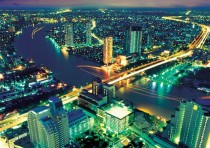 Wir denken bei Thailand automatisch an Sex-Business, Sex-Tourismus, Korruption und organisierte Kriminalität. Von außen. Christopher G. Moore lebt in dieser Gesellschaft.
Wir denken bei Thailand automatisch an Sex-Business, Sex-Tourismus, Korruption und organisierte Kriminalität. Von außen. Christopher G. Moore lebt in dieser Gesellschaft.
Heute geht es um Verbrechen, um Eliten, um Business, um Populismus und den Mittleren Osten. Polit-Thriller-Stoff galore …
The Origin of Big Crimes
I ran across this quote by Dr. Sriprapha Petcharamesree of the Centre for Human Rights Studies at Mahidol University who is quoted as having said, “We are stuck in a system of impunity. We can’t break it without accountability.” I want to come back to this idea that links impunity with accountability. It is indeed a truism and while necessary, it is not sufficient.
Crime fiction is a big house covering many approaches to anti-social, unlawful, and harmful conduct. Just to say the word ‘crime’ is to create a range of visions in the listener. Like ‘pornography’, ‘democracy’, ‘liberty’, ‘fairness’, and ‘justice,’ the term ‘crime’ evokes as much a visceral, emotional reaction as they do a philosophical debate. What if, like in the Lord of the Rings, you can put on the magical ring and become invisible? And the ring makes you exempt from law. Makes you immune from punishment. Would you be able to take that ring off after it had been in your family for generations, and would you want to keep the family tradition and pass it down to your children? The claims made by kin and friends are often in conflict with the claims made by society. Politics and crime is a series of questions of who do you put first, second and third in the scheme of things?
These are the questions of our time. In Thailand and many other parts of the world ordinary people are trying to change the old political arrangements elites have enjoyed, including their control of State and major institutions.
Francis Fukuyama’s The Origin of the Political Order (2011) gives a good framework to evaluate this process of change against the historical record of cultures going back to ‘deep’ time. Fukuyama’s thesis is: By understanding the nature of a structure of a political order, its institutional strengthens and weaknesses, and the historical forces that shaped the order and institutions, we can begin to understand the origin of big crime. By big crime, this isn’t the serial killer or major bank heist, but crime of a different order of magnitude. It is the difference between slavery and bank robbery. The scale is radically different, the damage and harm infinitely greater and more enduring. Mao’s Cultural Revolution, Pol Pot’s genocide are examples that come to mind.
 Chinese emperors had the absolute right to put anyone to death on a whim. Nothing in Chinese power and authority, which according to Fukuyama is over 2,000 years old, making it the first ‘modern’ state. But this modern Chinese state wasn’t accompanied either self-constrained in the exercise of power or laws that made power accountable. If the emperor chose to have hundreds of his court buried alive, that wasn’t a crime. In this case, the emperor had violated no law in carrying out the mass murder of courtiers. There was no accountability in such a system.
Chinese emperors had the absolute right to put anyone to death on a whim. Nothing in Chinese power and authority, which according to Fukuyama is over 2,000 years old, making it the first ‘modern’ state. But this modern Chinese state wasn’t accompanied either self-constrained in the exercise of power or laws that made power accountable. If the emperor chose to have hundreds of his court buried alive, that wasn’t a crime. In this case, the emperor had violated no law in carrying out the mass murder of courtiers. There was no accountability in such a system.
What strikes us is how such conduct was not regarded as a crime in ancient China. Fukuyama provides a compelling reason for the political deficits in ancient China and modern countries such as Thailand. The culprit is the degree of strength of the rule of law. Thailand, like Latin America, holds elections, has a parliament and other institutions of government, but the weakness of rule of law is evident in the corruption and bribe-taking culture. So far so good but at this stage we don’t really understand what makes for a ‘weak’ rule of law as opposed to a culture which has a ‘strong’ rule of law.
Fukuyama is instructive on this point. The place to start is with the political and social elites of a legal system. You learn about the nature of the system by studying the attitudes, privileges, alliances and culture of the elite members of that society. They are the most powerful and influential actors within the legal system. Whether the elites ‘own’, ‘control’ and ‘administer’ the legal system is another indication of stability. The elites and their allies want the state to act to protect their property rights and liberty against the state but not to act against them. They wanted it both ways in other words.
But it doesn’t stop there. That’s why this is the “origin of Big Crime” as someone has to pay for the system. If the elites won’t pay, that leaves the rest of us holding the bag. The unfair taxation and resource allocation can be traced to the elites who once they’ve secured their privileges and protections see no good reason to extend the rule of law to the vast majority of the population. Plunder their resources, and give them little in return is an old, tested and tried way of governing in many cultures throughout history.
Indeed Fukuyama gives good examples of Spanish and French elites aligning with the state against the masses to tax and exploit them. Ask yourself, is the rule of law a narrow category protecting the elite or does it cast its net wide, covering all members of the society and the institutions of government ensure the protections are not hollowed out in practice.
The fundamental issue of fairness becomes a central issue. Fairness of law quickly comes into play if members of the elites exempt themselves, relatives, and friends from the law. The exemption isn’t necessarily formal but is the background operating system for the entire governing enterprise. If a pattern of systematic exemptions occur there will be, in time, a backlash, and members of the non-elite segment—the vast majority of people in a society—believe the law (which might on the surface be ‘just’) is unfair because the authorities have failed or refused to apply it even-handedly. Ask yourself, do members of the elite in a legal system go to jail for breaking the law? It has been a question asked by many inside Thailand where elites and their children—no matter their political affiliation—avoid criminal sanctions for their criminal conduct.
Fukuyama drives home the elite exemption point throughout the book as a defining characteristic of a political system:
“For how can a mere institution constrain the rich and powerful if they don’t at some level believe in the need for self-constraint, or at least in the need to constrain others like themselves? If the judges and prosecutors and police can be bought off or intimidated, as happens in many countries where the rule of law is weak, what difference does the existence of the formal institution make?”
If the state can’t enforce the law against the elites then the law’s legitimacy won’t survive and it matters not that the law may have a respectable lineage in religion, tradition or custom. Laws are inextricably woven with the even-handed enforcement of the law. Exempting the elites from the application of laws is the surest way to bring the legal system into disrepute and to undermine the legitimacy of the law-makers, law-enforcers, and the law.
Without an elite willing to be constrained by law, the legal system will find itself under increasing pressure until it finally collapses under the weight of its own internal contradiction. From the ruins a new legal system with self-constraining elites create the environment for legitimacy to take root.
Dr. Sriprapha Petcharamesree’s remarks for the need for accountability of the elites is certainly true. But without a broad consensus that the elites not only wish protection from the law against stronger agents, but are also subject to laws like all other citizens. Until there is an attitude among the elites to submit to the law even though certain privileges, benefits and exemptions will be reduced, there can be no accountability. With such a change of attitude, the old system will cook the accountability books. Claims that the books balance and deflect the uneven-handed application of the law through censorship, intimation, threats, reprisals, exile or imprisonment of critics.
Next time you see the new Benz or BMW with the decals and icons showing the owners affiliation with powerful social, political or economic institutions, you can read them for what they are: we are exempt from laws. We can do what we like. We are too powerful to be stopped by the police and certainly not arrested. We exist above the law. Thailand has become a society divided into factions by colour, and more importantly by decals and logos and icons that represent associations with power, wealth and status. These are more than just symbols. People with the right decal on their windscreen are immune from many laws. It is the prevailing attitude of Thailand’s elites that they are entitled to such immunity that becomes exhibit A in making the weak rule of law case. The Thai elites are strong, and show indication that ‘self-constraint’ isn’t something associated with elite rule.
The new social media is making inroads into the legitimacy of elite attitudes, values and claims. As such matters are difficult to explain let alone justify once raised, the reaction is to attack the person making the assertion rather than addressing the underlining issues. Fukuyama and others like him have raised questions about the social and political obligation of elites to constrain themselves for a common good. Elites, who customarily have left a few crumps for the rest of society, fear democracy. This is totally understandable as to why they would be afraid. Such elites can continue their unrestrained activities only when yoked in the field with an authoritarian government. Cutting down on privileges and benefits by the elites as we’ve seen just about everywhere creates societal conflict and casualties. Fukuyama’s book raises the question as to when and where the elites who absolute power over a legal system voluntary ceded power to a larger community?
This is the great crime story of our time. It remains unclear whether Thailand’s elites, or those elsewhere in the world—and this is hardly a problem limited to Thailand—will find a way to share resources, forgo exemptions, modify privileges all in the name for a more fair, and just society. Technology is not the friend of the elites in this contest. The elites have discovered that they no longer control the information or the message. Ordinary people have tapped in the global information flow that like a tsunami washes over the state controlled media. The elites have also been submerged in the new information age. Fighting against the new technology makes the elites appear desperate and fearful, and their actions harsh, repressive and futile.
We are in the election season in Thailand, with the election scheduled on 3rd July. It is early days but from the starting gates. So far none of the political parties or leaders has outlined how they propose to deal with the entitlements, privileges and exemptions of the elites. Such an absence of focus might be evidence the election is not a battle to constrain the elites, but a battle between various groups of elites who once in power would wish to have all the privileges, benefits and exemptions that normally go with governing.
Populism isn’t the remedy for the problem when the real issues are justice and fairness. Buying off the masses with money programs is only a temporary way to shore up legitimacy. Sooner or later, the unfairness in the way the system works returns and people take to the streets. The hard political work is to establish a new social consensus inclusive enough to bind the elites and ordinary people in a compact to observe the law. People habitually avoid hard work. But a point does arise, when the pressure, contradictions, and anger can no longer be restrained by the state. That places modern authoritarian governments in a bind: Pressure from the elites to keep their exemptions, and upward from the masses to bring the elites into the fold. There are a number of countries where such issues are less on the table as in the city squares and streets.
The Middle-East is a great test of such a historical event in the making. Marx might have been surprised to find that a digital opium pipe—with an unlimited supply, fixes and addicts—had largely supplanted religion for the literate class. And from those new digital opium dreams, new arrangements of power may lead to a more equitable, fair, just and accountable society. Or would they create a new digital elite whose members like the traditional elites before them hoard and treasure their entitlements and exemptions, and move heaven and earth to preserve society’s buffet for themselves and their kin?
Christopher G. Moore
Dieser Text ist am 27. Mai auf unserer Partner-Site erschienen.
Bangkok Noir
The Cultural Detective. Kindle/Amazon. UK and Kindle/Amazon. USA. His lastest Vincent Calvino novel, 12th in the series, is titled 9 Gold Bullets and is available as an ebook on Kindle.
Moores Podcast
Die Vincent Calvino-Romane.
Der Autor beim Unionsverlag, hier.
Zu Christopher G. Moores Website.











